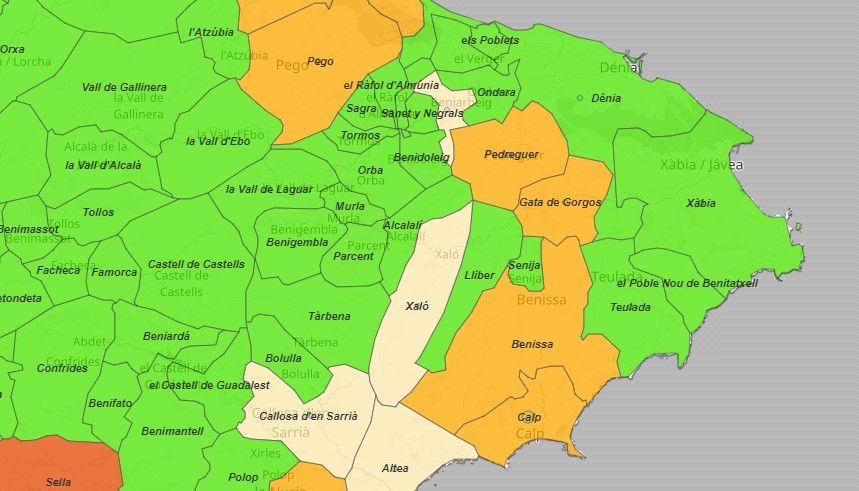VIRUS UPDATE: Xàbia remains in ‘New Normal’ category, despite 3 new positive cases
The IA rate for the Comunidad Valenciana has increased by more than 84% compared to two weeks ago and the region as a whole is now in the ‘Medium Risk’ category.

Tuesday 29th June 2021 – Compiled by MIKE SMITH
The total number of positive coronavirus cases detected by PCR test in Xàbia has climbed to 1,513, according to the latest update from the regional health ministry. The number of cases detected in the past 14 days stands at 6 cases, which means that the municipality’s 14-day IA rate, a measure of the speed at which the virus moves through the population, has risen to to 21.42 cases per 100,000 inhabitants and the town remains in the ‘New Normal’ category. There have been no new deaths in Xàbia since late March and the number for remains at 12.
In the Marina Alta region, there have been 62 new positive cases detected in the past 14 days whilst the total number of positive cases since the pandemic began has been confirmed as 10,224 since the last update, a rise of 23; Calpe 6, Benissa, Dénia and Xàbia 3 each, Pedreguer, Pego and Teulada 2 each and one each in Beniarbeig and Gata de Gorgos. The region’s 14-day IA rate has risen to 35.16 cases per 100,000 inhabitants – an increase of 76% over two weeks – and the region is in the ‘Low Risk’ category. There have been no new deaths since the last update and the region’s toll remains 203.
Calp (98.60), Gata de Gorgos (64.07), Pedreguer (63.44), Pego (59.21) and Benissa (53.15) are all at the ‘Medium Risk’ level whilst two municipalities are in the ‘Low Risk’ category: Beniarbeig (46.32) and Xaló (34.87). The rest of the municipalities in the region are at the ‘New Normal’ level, with 23 of them showing no infection spread over the last 14 days.
Spain
Spain’s 14-day IA rate is 100.06 cases per 100,000 inhabitants and the country remains in the ‘Medium Risk’ category. Although the rate has dropped by 4% compared to two weeks ago, it has actually been rising since June 23rd. The Positivity Rate, the measure of how many coronavirus tests return positive, has risen to 4.67%; a value of 5% or less indicates that transmission of the virus is more or less under control.
Across Spain, all autonomous regions and cities are below the 200 mark for cases per 100,000 inhabitants. Andalucia leads the way (164.05) and is joined by Cantabria (160.23) in the ‘High Risk’ level. The autonomous city Ceuta (16.63) is the region with the lowest rate of infection in the whole country and is the only area in the ‘New Normal’ category.
The Comunidad Valenciana (75.47) has seen its rate rise by 84% compared to two weeks ago and attempts to curb the infection have not been helped by the now infamous students end-of-term trip to Mallorca in which at least 76 young people from the region returned home showing mild symptoms of COVID-19. Investigations are under way and all students who travelled to the Balearic island have been told to isolate themselves.
With regards to the number of new infections in the Comunidad Valenciana, it has been confirmed that 52% of those recently detected correspond to young people between 15 and 29 years of age. In addition, most of the more significant outbreaks of the disease in the region have been suffered by younger people and mostly originated in social circumstances. Both the president of the Generalitat Valenciana, Ximo Puig, and the regional health secretary, Ana Barceló, has reiterated their calls for prudence and responsibility from the region’s citizens.
The newspaper El País has reported that Spain will require people travelling from the UK to provide proof of full vaccination or a negative PCR test taken in the 72 hours prior to arrival, due to concerns over the delta variant of the coronavirus. This will particularly affect those travelling to the Balearic Islands, which move into the UK Government’s so-called ‘green list’ on June 30th. Spain has rejected mandatory quarantine for UK passengers entering the EU, demanded by Germany amongst others, because of fears that it would further damage an already deteriorated tourism sector.
Vaccination (28.06.21)
Spain has administered 39,914,204 doses of vaccine, which is 92.6% of those which it has already received. A total of 16,609,913 people have completed the recommended course, which is 39.4% of the total of the population which is to be vaccinated (40,129,822).
According to the latest data provided by the health authorities, 84.5% of people aged 40 and over in Spain have received at least one dose, with 51.0% having completed the recommended course.
The Comunidad Valenciana has administered 4,171,753 doses of vaccine, which is 89.6% of the total which it has received. A total of 1,662,991 people have completed the recommended course, which 38.8% of the population which is to be vaccinated (4,289,305).
According to the latest data provided by the health authorities, 80.2% of people aged 40 and over in the Comunidad Valenciana have received at least one dose, with 48.5% having completed the recommended course.
LINKS
- Actualización nº 401. Enfermedad por el coronavirus (COVID-19). 28.06.2021
- GIV COVID-19 Gestión integral de la vacunación COVID-19
- COVID-19 C. Valenciana: Monitoratge de la situació



